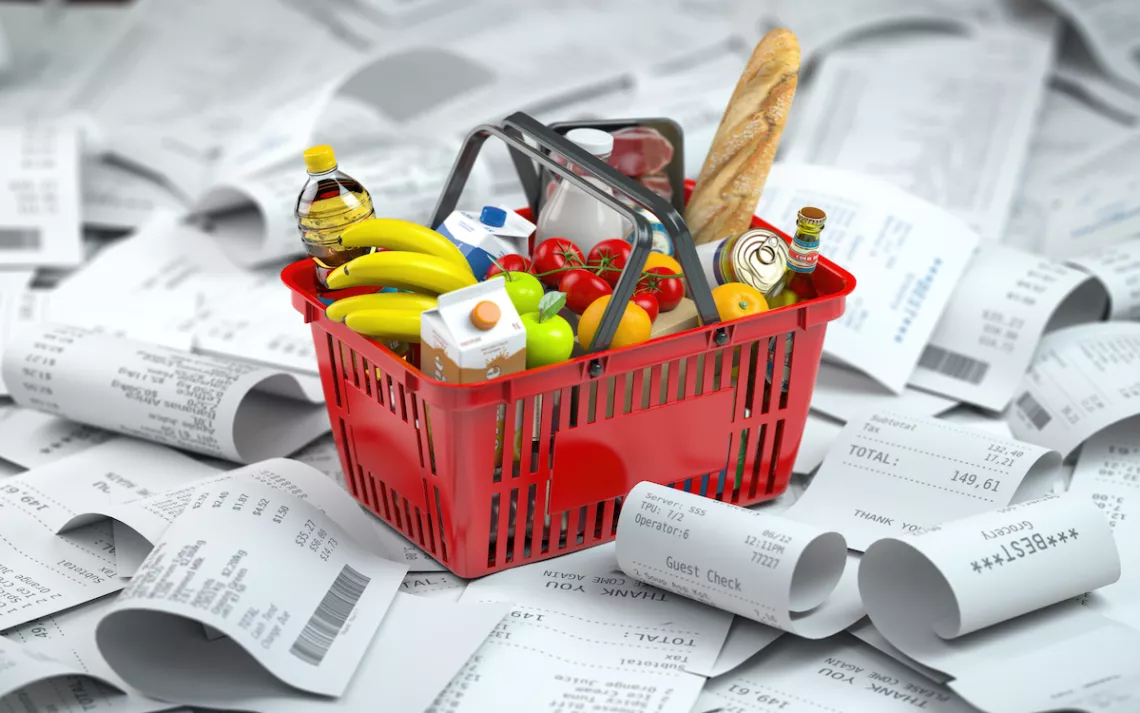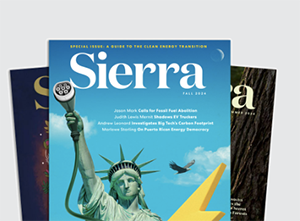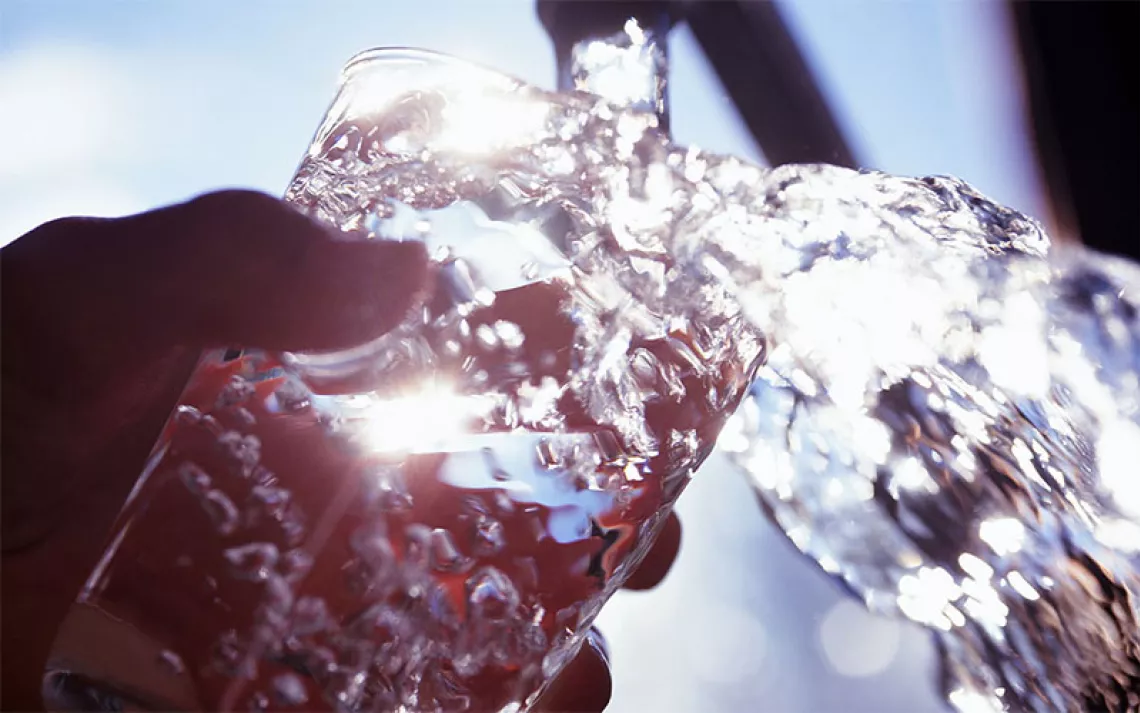How to Have Your Less-Toxic Cake (and Pizza, Canned Food, Popcorn) and Eat It Too
Avoid toxic receipts and electronics while you’re at it

Photo by iStock/Bet_Noire
I bet you a dollar that you don’t know all the products that have toxic chemicals. In April 2022, the Campaign for Healthier Solutions and the Ecology Center Healthy Stuff Lab found hazardous chemicals in receipts and major brands of canned food, microwave popcorn, frying pans (and cake pans, with and without nonstick claims), headphones, and plastic products, such as ones marketed to kids.
The report found that these products are commonly sold at stores throughout the United States and in Ontario, Canada, including at 99 Cents Only, Dollar Tree, Family Dollar, Dollar General, and Five Below franchises. Just avoiding those stores isn’t enough because toxic chemicals are in product categories beyond those listed in the report. The good news is you can still protect yourself and ask businesses to help you do the same.
But first, here are products to avoid.
Bisphenols (BPA, BPS, etc.)
Bisphenol S (BPS) was found in 100 percent of receipts tested, according to the report. BPA was also found in canned food such as Deerfield Mixed Vegetables, Dolly Mixed Vegetables, and Polar Sardines. Canned food in general is lined with plastic. Studies show BPA readily migrates from cans into food and that very small levels are harmful for our health. In general, high levels of phthalates can also be found in processed food, such as from fast food restaurants or grocers (like boxed macaroni and cheese), and higher-fat foods like meat and dairy. Bisphenols like BPA and BPS can also be in clothes, laundry detergents, receipts, plastic (such as foodware and toys), skin-care products, tickets, labels (deli, cheese, prescription), and ultrasound and medical machine printouts.
In 2022, new research suggested harm from BPA exposure can occur at levels much lower than previously thought. BPA can penetrate skin so deep that it cannot be washed off. It is linked to behavioral issues, cancer, asthma and diabetes, and impotence. BPS might not be better. There is strong evidence that BPS is linked to impaired brain development and behavior, obesity, impaired genital development and sexual function, type 2 diabetes, cardiovascular disease, high blood pressure, high cholesterol, impaired liver function, infertility, miscarriage, preterm birth, and early puberty.
Flame retardants (FRs)
Now is the time for environmental journalism.
Sign up for your Sierra magazine subscription.

Environmental advocates and scientists have helped pass laws to end the use of chemical flame retardants in foam household products and consumer electronics. So it is a surprise to find them in cheap electronics marketed to children. Here are some examples:
- Disney Minnie Mouse headphones (560,623 parts per million)
- Disney Princess Kidsafe wireless headphones (656,000 ppm was in the earbud foam)
- Marvel Avengers Kidsafe headphones (381,869 ppm)
- Superman headphones (612,081 ppm)
Those amounts far exceed the maximum limit of 1,000 parts per million of FRs allowed in mattresses, upholstered furniture, and kids' car seats, strollers, walkers, changing pads, and playmats sold in California. Some FRs like PBDEs may be linked to impaired cognition and ADHD, especially if exposure happened at a young age. People and other animals are exposed to FRs through inhaling dust and eating food or absorbing FRs through skin. FRs are hard to remove from skin.
Per- and polyfluoroalkyl substances (PFAS)
PFAS chemicals can be found in just about everything, including cookware and food, such as these:
Cookware
- Family Chef nonstick 10-inch frying pan
- True Living round cake pan with DuraGlide nonstick finish
Microwave popcorn
- Act II Butter Lovers’ microwave popcorn (473 ppm)
- Orville Redenbacher's popcorn (625 ppm)
- Pop Weaver extra butter popcorn (353 ppm)
PFAS can migrate from food packaging into your body through your skin and food. Exposure to PFAS may increase the likelihood of severe COVID-19 infection, and PFAS has been linked to reduced vaccination response, obesity, and diabetes as well as an increased risk of auto-immune diseases, kidney and testicular cancers, miscarriage, cardiovascular disease, allergies, and asthma.
Vinyl (polyvinyl chloride, PVC)
PVC is one of the regrettable substitutes for toxic BPA coatings in cans. PVC is marked with the recycling code 3 and also used to make kids' toys and electronics. Soft PVC is also found in flexible plastics such as shower curtains and carpet and other flooring backing. Hard PVC is found in things like vinyl records, window frames, and pipes. Exposure to vinyl chloride, the building block of PVC, has been linked to cancer in humans.
The report found these brands have PVC:
Canned food
- Campbell’s Chicken & Star Shaped Pasta
- Clover Valley Shredded White Chicken
- Libby’s Chicken Vienna Sausage
- Summer Is Inside Tomato Paste
Electronics
- Momentum Brands noise-reducing color earbuds
- Traxx squishy unicorn headphones
Kids' products
- Disney Frozen II hair set ensemble
Fake teeth and lips (I can’t make this stuff up!):
- Jokes and Gags Wacky Lips
- Joking Around Funny Teeth
How to make safer choices about what you consume
It can be easy to feel deflated when you see how pervasive these hazardous chemicals are. Don’t despair. Here are some simple steps anyone can take to make safer choices about what you buy and use in your everyday life.
Ask businesses for paperless receipts. There’s an app for that!
You can avoid absorbing toxic phthalates through your skin from receipts. Just ask for an email or text receipt as soon as cashiers start ringing up your purchases. Many stores will only do that if you ask. And you can join me in using the Remark phone app to nudge any business to ask customers if they’d like an email or text receipt. While you’re at it, use the app to nudge businesses to create other policies and practices regarding sustainability and labor.
Eat PFAS-free, zero-waste popcorn while watching a PFAS thriller
A plain paper bag can be like a wolf in sheep’s clothing and have toxic PFAS. So make bagless, cheesy elote-flavored stovetop popcorn by Hell Yes It’s Vegan. Or make your own microwavable PFAS-free popcorn in a reusable bag. If you have to use a paper bag, try one that’s grease-proof, PFAS-free, and Forest Stewardship Council (FSC)-certified by If You Care. For a good time, eat it while you sit back, relax, and watch Dark Waters, a thriller based on the true story of how PFAS caused birth defects and cancer.
If you can, avoid drinks and food in cans
Toxic plastic can be found in drink- and food-can linings, lids of glass jars and bottles, and aerosol cans for whipped toppings and nonstick sprays. If you can’t buy package-free food, try canned food by Edward & Sons (which includes brands like Native Forest, Let’s Do Organic, Let’s Do Gluten Free, The Wizard’s, Premier Japan, More Than Fair, Road’s End Organics, Nature Factor, and Ecuadora). Though they line cans with either a polyester or epoxy resin, they might be the only major brand that tests to ensure cans don’t have intentionally added bisphenol compounds, including BPA, BPS, BPAF, or BADGE. They test via a licensed, third-party laboratory using a High-Performance Liquid Chromatography (HPLC) method. But according to EWG, though polyesters may have less potential for direct human harm than other alternatives, they are toxic to aquatic life and can persist in the environment for many years.
Be prepared: BPA-free doesn’t mean toxic-free
If a product says it doesn’t have a certain chemical, such as BPA, it can still have other toxic chemicals. For example, a “BPA-free” can might be coated with polystyrene, which is derived from styrene, a possible human-cancer-causing chemical.
Have your cake and pots and pans without BPA, PFAS, lead, and cadmium
If you can, use glass, stainless steel, or naturally nonstick, plain cast-iron cookware. (I walk on the wild side with my “lightweight” cast-iron woks!) According to the Ecology Center, you might want to avoid questionably less-toxic silicone enamel cookware and other pans in their October 2021 and 2020 list of pans to avoid.
Petition 99 Cents Only stores to stop selling toxic products like ones above
Sign the Campaign for Healthier Solutions’ petition. 99 Cents Only has scored an F since 2017 on the Toxic-Free Future’s Retailer Report Card.
Petition other major stores to try recommendations in Toxic-Free Future’s Retailer Report Card
If you see Toxic-Free Future’s Retailer Report Card, you might want to sign their petition.
Ask me about where to get someone to fix almost anything (except your relationships)
For example, ask where to fix random things like cast-iron pans, coffee makers, bowling balls, and baseball mitts. Or ask me about hospitals for stuffed animals and dolls!
 The Magazine of The Sierra Club
The Magazine of The Sierra Club



